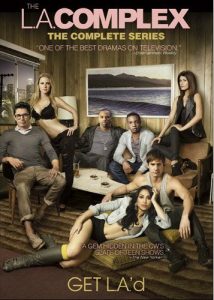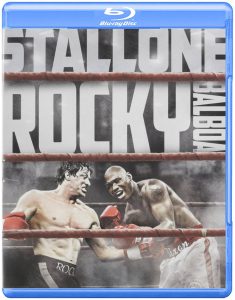Rightly ranked by IMDB voters as the best of the “Rocky” sequels (with a 7.2 rating), “Rocky Balboa” (2006) is a beautiful grace note to the fighting portion of the Italian Stallion’s career. (His training career appears to continue in “Creed.”) While the film makes few bones about the fact that a 50-something former champion can’t beat a current champion in his prime, it does show that people get better at other things with age.
Sylvester Stallone has always been a good, naturalistic actor, especially in this role. While not a flawless writer, he kept us interested in the lives of the Balboa clan for five films. But on “Rocky Balboa,” he delivers his most polished script and most seasoned direction without too much glitz or gimmickry (admittedly, there is some spectacle when the climactic fight takes place at the MGM Grand in Las Vegas). The film’s pacing – especially in the early going — lets a viewer soak up and enjoy the world, and the cinematography (by series newcomer J. Clark Mathis) should be framed in a museum.
The most lump-in-your-throat sequence of “Rocky Balboa” finds Rocky – dragging along the less enthusiastic Paulie – revisiting the sites of big moments from his life such as his old apartment stoop where he just wanted Adrian to trust him and the skating rink (since torn down) where they had their first date. Rocky has done this “Adrian tour” every year since her death four years earlier of breast cancer. Not many people in the real world have the time or inclination to be so nostalgic, but it sure is a nice idea.
As I noted in my reviews of “Rocky” and “Rocky V,” I love looking at north Philly. I personally wouldn’t want to live there, but I can see why the films’ characters are attached to it. Rocky and Paulie (working at the meat-packing plant again, now as a night watchman) both note that after a while, people become the places they live. Rocky is happy with this. Paulie is incapable of being happy, but he does note that he has nothing else, which in Paulie-speak means … well, something meaningful. Being the place you live isn’t a good thing for everyone, though, as it illustrates what rough shape Little Marie (Geraldine Hughes) finds herself in. (She’s the “Screw you, creepo!” girl from the first film.) The home she shares with her son, Steps, abuts a burned-out husk of a building on a Philly street that was dropped from the bus route 20 years ago.
In a series of vignettes that also provides delicate through-lines, we see Rocky’s interactions with Marie and Steps. He gets jobs for both of them at his restaurant, Adrian’s, which features – as Paulie puts it — Italian food made by Mexicans. As Rocky changes her front-porch light bulb, Marie tells Rocky he doesn’t owe them anything. In one of the film’s three monologues that show the brain-scrambled Rocky is sometimes smarter than common wisdom, he asks why they have to owe him something in order for him to do something nice. Similarly, Spider Rico (Pedro Lovell, reprising his role from the original, which happens to be his only film role) accepts Rocky’s free lunches at the restaurant and the favor eventually comes full circle when Spider washes dishes and becomes Rocky’s spiritual adviser. But, of course, Rocky wasn’t expecting a return on his investment.

Rocky has always had a firm grasp of what’s important: Doing what you love while surrounded by people you love in a place you like to be. Rocky’s son (“Gilmore Girls’ “ Milo Ventimiglia, who does a wonderful job mimicking Sage Stallone’s searching looks at his dad) is struggling to learn this. Going by Robert rather than Rocky Jr., he works a job that has something to do with numbers, and then he quits simply to support his dad as he trains for the fight. He is turned around by Rocky’s second great speech, where he notes that Robert shouldn’t use Rocky’s fame as an excuse for his troubles.
Although the Marie and Spider callbacks demonstrate this movie’s attention to continuity, “Rocky Balboa” asks viewers to make one big “just go with it” leap. In “Rocky V,” Rocky has irreversible brain damage and will risk making it worse if he takes more punches. In “Balboa,” he clears the boxing licensing board’s tests “with flying colors.” That is completely inexplicable. The board wants to deny his license anyway based on his age, but — in Stallone’s third great monologue of the film, and one that warms my libertarian heart — Rocky changes their mind by arguing that it should be none of their business what he does with his life, even if they mean well.
On the boxing side of things, “Rocky Balboa” picks up its critique of professional boxing from “Rocky V.” Mason “The Line” Dixon (real-life boxer Antonio Tarver, in a performance even more forgettable than Tommy Morrison’s) is the champ, but people hate him and the media rips him for not fighting any legitimate challengers, just like Tommy Gunn’s situation. Dixon’s team sets up a fight against Rocky as a way to 1) make a boatload of money, 2) get the public to like Dixon when he defeats Rocky but respectfully goes easy on him, and 3) allow Rocky to fulfill his desire to get back in the ring and be competitive. In a wise choice, these promoters are not portrayed comically, as Gunn’s handler was. After all, with Rocky getting a clean bill of health, there’s no need for manipulation: This bout is a win-win situation for both boxers, not to mention “charity,” which will get a cut of the proceeds.
“Rocky Balboa” has a bit of fun with age-related humor without delving into “I’m getting too old for this s—” territory. In the best bit, trainer Duke notes that Rocky can’t win with speed or flexibility due to his calcified joints. But, on a point Duke and the HBO analysts agree on, the last thing to go is a boxer’s punching ability, so Rocky indeed has a “puncher’s chance,” as the adage goes. In this movie, the training is not about doing the impossible (from a sporting standpoint, Rocky has never been this much of an underdog), it’s about the joy of feeling alive. That’s something anyone can experience if they want to. Indeed, we see real Philly citizens re-enacting the run up the museum steps under the closing credits.
As with “Rocky V,” the casting of a real-life boxer lends legitimacy to the ring scenes. I didn’t care so much for the glitzy production and the blatant ESPN and HBO tie-ins (we even get informational graphics on the screen), although I suppose that’s a reflection of this movie taking place in the 21st century. Admittedly, I did find myself watching the Balboa-Dixon fight as if it was an actual sporting event with nuances, rather than waiting for some kind of gimmick. “Rocky Balboa” almost stumbles on its landing like “Rocky V” did — an alternate ending, included in the DVD extras, has Rocky absurdly winning a split decision even though Dixon clearly lands many more punches to Rocky’s cast-iron jaw. But smartly, the final version of the movie finds the P.A. man announcing Dixon’s win as Rocky walks to the locker room one last time and the crowd gives him a standing ovation.
But enough about the boxing. As becomes clear in this sixth film, the “Rocky” movies are about the characters, and this one works because Rocky is so genuinely likable that we hang on his every word, even if it’s a bit slurred. Life never becomes easy for him. Indeed, going on after Adrian’s death seems to be the hardest thing he’s ever done, and he’s also baffled as to why he doesn’t have a tighter relationship with his son. Meanwhile, he connects with new people effortlessly – as embodied by Marie and Steps, but also a rude girl at the bar whom Rocky inspires toward self-confidence, almost by accident.
Is being a good guy the best path through life, or do the “Rocky” films present an unrealistic ideal? Well, one thing is clear: As many loved ones as Rocky loses, he always has a packed corner of new and old friends at the end of those bouts. Whether he’s living in poverty (“Rocky”) or in a mansion (“Rocky IV”) or in a modest apartment (“Rocky Balboa”), he always seems to have the same amount of contentment. Maybe he’s smarter than we think. And maybe he’ll have some good advice for Adonis Creed.
More “Rocky”/”Creed” reviews:

